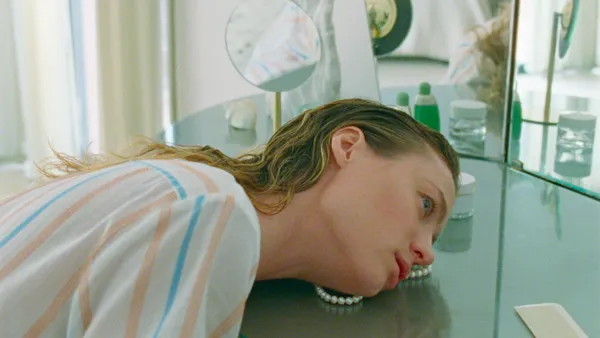Eye For Film >> Movies >> Swimming Home (2024) Film Review
Swimming Home
Reviewed by: Jennie Kermode

Adapted from the novel by Deborah Levy, Swimming Home is a story largely played out within the minds of its characters, but it’s the external environment that sizzles on the screen. A highly mannered approach, a staccato script and deliberate emotional distance mean that the drama never really comes alive, but the whole thing looks and sounds divine.
We follow a family of three as they relocate to a villa somewhere on the Greek coast (the original was set in France, and here they still have a Parisian friend in tow). Joseph (Christopher Abbott) is a well known poet who, as is wont with such figures in literature, hasn’t written for a long time. Isabel (Mackenzie Davis), his wife, is working on a creative project of her own and may have something sexual happening on the side too, as suggested by intermittent dance sequences calculated to disturb. She’s bored with Joseph and with the affairs which he turns to in fruitless pursuit of inspiration, frustrated that people keep expecting her to have a reaction to a sexual betrayal rather than the more important thing, the fact that he has failed her creatively. Both are self-absorbed – one might wonder why the friend puts up with them if not for their gorgeous house – and they pay little heed to their 15-year-old daughter, Nina (Freya Hannan-Mills), whose very name seems like a placeholder. When they get back from a drive, she’s waiting for the, She says “There’s a woman in the pool.”

The woman is Kitti (Ariane Labed), a friend of their driver (yes, they are unrealistically wealthy). She’s floating naked on her back, something that US critics have read far too much into. This is Greece and, as she notes, it’s hot. Notably, she is not visually coded as a sex object; the camera does not care about her curves or the way the light moved across her. She is tall and (artificially) blond, lean and muscular and very much at ease in her flesh. She fits easily into the seducer role traditionally occupied by young men, attaching herself to the household with the aid of Isabel, who is ready for an experiment, and gradually disrupting it on every level. Her scenes with Nina are the most disturbing, but ultimately it’s Joseph on whom she concentrates her focus, as if she has known something about him all along, something from the past that threatens the future.
With this capable cast and a handsome yet confined location, the film has all sorts of potential. It builds up slowly, the languid summer air full of buzzing insects into whose chorus a sound that might come from human lips softly blends, and then there’s one of those upside down road shots which are popular at the moment, and when we reach the house the camera lingers on the gate clicking shut behind the car. Writer/director Justin Anderson makes lovely use of overexposure, finding all those textures in the light that the eye finds before it has settled after one has stepped out into a too-bright day. His shadows are always tinged with colour at least as intriguing as they are disturbing, promising cool relief. Pale blues, greens and yellows shape the landscape around white walls and hints of bleach terracotta. It’s a space in which to slowly unwind, to drift and dream of summer days.
And dream one might, because there isn’t much in the film to hold you. Isabel’s project doesn’t satisfy her. She has spent time out in the field, photographing wars, that most addictive of professions; everything else falls short. Joseph is artistically stifled, resentful and haunted by his past as a war orphan in Bosnia. Nina experiments sexually but feels nothing. When it’s this dry, we’re told, bears often come down from the hills to drink from the pools, but we never see a bear; indeed, it’s apparent from the start that we will never see a bear. Bears have better things to do. They would feel embarrassed at being associated with something so self-conscious and, otherwise, so empty.
Anderson has assembled all the external features of a masterpiece, but has forgotten to give us a reason to care.
Reviewed on: 28 Apr 2025



















